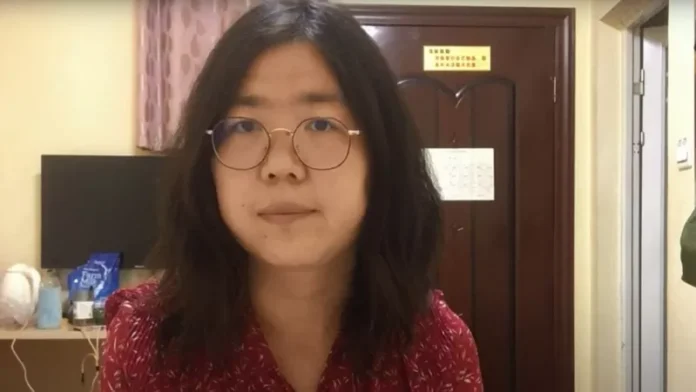Washington – In the early months of 2020, as the world grappled with the COVID-19 pandemic and the lockdown in the Chinese city of Wuhan, a few brave citizen journalists emerged as the voices of the epicenter.
One of these journalists was Zhang Zhan, a 36-year-old former lawyer who fearlessly documented the unfolding crisis in the city where the virus first appeared.
But on May 13, 2020, Zhang’s voice was silenced. In her final YouTube video, filmed in front of a Wuhan train station, she expressed concerns about the human rights abuses she witnessed during the lockdown and criticized the police’s involvement in enforcing containment measures.
According to Jane Wang, a U.K.-based activist who launched the Free Zhang Zhan campaign, Zhang disappeared after posting this video. “The date of her arrest should be May 14, but it could have happened on the evening of May 13, so we are not sure,” Wang told VOA. “She was escorted by police from Wuhan to Shanghai, and we believe this happened in between.”
In December 2020, the Chinese government sentenced Zhang to four years in prison for allegedly “picking quarrels and provoking trouble.”
However, on Monday, May 24, 2021, Wang posted a 28-second video on X (formerly known as Twitter), in which Zhang confirmed her release from prison on May 13 and expressed her gratitude to those who had been concerned about her well-being.
“Hello everyone, I am Zhang Zhan. On May 13 at 5 AM, the police brought me to my brother’s home in Shanghai. Thank you all for your help and concern for me. I hope everyone is doing well. I really have nothing more to say,” Zhang said in the video.
This video was released a week after Zhang was expected to be released from Shanghai Women’s Prison on May 13, but she did not surface publicly for several days. On May 17, the U.S. State Department issued a statement expressing concern about her disappearance after her apparent release.
“The United States has repeatedly expressed our serious concerns about the arbitrary nature of her detention and the mistreatment she faced at the hands of authorities,” the State Department said. “We reiterate our call for the People’s Republic of China to respect the human rights of Ms. Zhang, including immediately ending the restrictive measures she and all journalists in China face.”
The State Department also urged China to ensure the safety and freedom of journalists in the country, emphasizing the importance of allowing them to report freely.
The recently released human rights report on China by the State Department highlighted “serious restrictions” on freedom of expression and media, including the criminal prosecution of journalists, lawyers, writers, bloggers, dissidents, petitioners, and others. It also noted the arrest of countless citizens for allegedly “spreading fake news.”
Zhang’s case is not an isolated one. Several other citizen journalists faced disappearances similar to Zhang’s and were later sentenced to prison for documenting the initial stages of the pandemic in China.
In China, any expression of views that differ from the government’s official narrative on pandemic-related matters continues to be a sensitive issue. Lin Shengliang, founder of the China Human Rights Accountability Database, explains that the Chinese authorities often use both soft and hard tactics to silence those who speak out.
According to Li Yong, a Wuhan citizen who shared the U.S. State Department’s statement on Zhang in a WeChat group, the Chinese State Security forces warned him not to share information about Zhang.
“The local community’s state security officer said, ‘These posts are no longer allowed. Be silent. Things involving Zhang Zhan are not allowed to be shared.’ Anyway, I promised not to post it again,” Li told VOA.
Li had befriended Zhang when she came to Wuhan in 2020. He advised her to be cautious in her criticism of the government, but she was a person of faith and remained persistent in her reporting.
According to Wang, Zhang is a devoted Christian who openly expressed her faith. However, her church was shut down and banned from gathering four years ago, before she went to Wuhan. Wang also raises concerns about whether Zhang is currently allowed to travel to another city or attend a church gathering in Shanghai.
Wang believes that Zhang’s situation may change dramatically if the authorities decide to increase surveillance on her. “Right now, guards are watching

